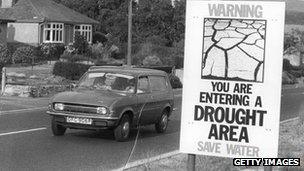Drought fears for Britain prompt water summit
- Published

Parts of south-west England saw 45 days without any rain in the summer of 1976
The environment secretary is to meet water companies, farmers and wildlife groups amid fears that parts of Britain may face the worst drought since 1976.
Parts of south-east England, East Anglia and the east Midlands are among the worst affected areas.
Trevor Bishop, head of water resources at the Environment Agency (EA), says it is "planning for the worst".
Water restrictions could be introduced unless heavy and prolonged rainfall takes place before April, the EA warns.
The Department for Environment, Food and Rural Affairs (Defra) called Monday's summit to look at how to deal with the drought.
Environment Secretary Caroline Spelman will meet water companies - who are encouraging customers to cut down on consumption - along with other concerned groups.
A lack of rainfall over the past few months means groundwater levels are still falling in many areas.
Last month EA experts said water levels were so worryingly low that twice the average rainfall was needed if rivers are to recover and a hosepipe ban is to be avoided.
Stranded fish
"We're reaching the end of the second consecutive dry winter and that's very unusual so the situation is getting quite serious across the east of England, the Midlands and the south-east," Mr Bishop told BBC Radio 4's Today Programme.
"It's not quite as bad as the situation we saw in 1976, but it's unusually close so we're planning for the worst."
The EA, which covers England and Wales, has had to oxygenate rivers and move fish that have become stranded in isolated pools and farmers have been prevented from drawing water from rivers in some cases.
It is very unusual to be carrying out this kind of activity at this time of year, Mr Bishop said.
This week the Centre for Hydrology and Ecology reported that average rainfall so far this winter was the lowest since 1972., external
Northamptonshire has had the driest 16 months since records began and the eastern region of England has had its driest spell in 90 years, the EA said.
Paul Valleley, director of water services at Anglian Water, said it was monitoring the situation very closely but the likelihood of a hosepipe ban was increasing if it remains dry.
Trevor Bishop: Drought comes at the end of the second consecutive dry winters in the UK
"We do have some reservoirs that are 20% below where we would ideally like them at this time of year," he said.
"It really does now depend on how the weather goes in the coming weeks and months as to how much of that water we do recover.
"If it remains dry then we will have a problem coming into the summer."
Water companies, the EA, Natural England, British Waterways, the Met Office, representatives from the agricultural sector and environmental non-governmental organisations will be at the summit, Defra said.
Ms Spelman said: "All of our activity is going to be carefully co-ordinated so that we are able to minimise the effects of unpredictable water availability and support people in doing the right thing in taking sensible measures to save water."
- Published13 February 2012
- Published25 January 2012
- Published1 December 2011